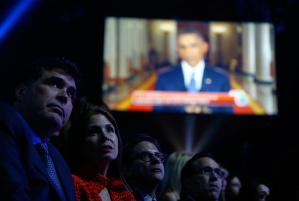
President Obama's address on illegal immigration Thursday night left mixed feelings among Christians, as well members of both political parties. Though he said that "the best way to solve the problem is by working together," he painted a very 'us versus them' picture, and scolded members of Congress who failed to move immigration bills forward.
"The action is an unconstitutional power grab of historic proportions by a president whose tenure has centered on governing by overreach," said Jay Sekulow, chief counsel of the Washington, DC-based American Center for Law & Justice. "The president is treading on very dangerous ground by issuing an executive order on immigration where there is underlying law in place. The president is changing the law by executive fiat - something that he does not have the power to do."
Starting out positively, the president referenced America's status as a nation known for its immigration, and said, "For more than 200 years our tradition of welcoming immigrants from around the world has given us tremendous advantage over other nations."
He also spoke to those who have voiced concern over an amnesty program, and instead argued that "America's current broken immigration system is true amnesty."
Introducing his plan of action, President Obama encouraged illegal immigrants to get right with the law and come out of the shadows. He also warned that the plan does not apply to people who've come here recently or will come here in the future, and it does not allow for citizenship.
"If you've been in America for more than five years, if you have children who are American citizens or legal residents, if you register, pass a criminal background check, and you're willing to pay your fair share of taxes, you'll be able to apply to stay in this country temporarily without fear of deportation," he said.
But Thursday night's speech also sent a larger message regarding his thoughts on his role as president.
"Last year I worked with Congress on a comprehensive fix, and last year 68 Democrats, Republicans, and Independents came together to pass a bipartisan bill in the Senate that would've doubled the number of border patrol agents," he said.
He cited independent experts who said the law would help grow the economy and shrink the deficit, and blamed Republicans for refusing to allow a simple vote to pass the bill - what he called a "common sense law."
The president also had strong words for those not in agreement with him, and reassured Americans that the actions he is taking aren't only lawful, but also follow along with the same actions every president over the past half a century has taken before him. He also took a back door approach to threatening to continue down the executive order road unless Congress works with him.
"To those members of Congress who question my authority to make our immigration system work better, or question the wisdom of me acting where congress has failed, I have one answer - pass a bill. I want to work with both parties to pass a more permanent legislative solution, and the day I sign that bill into law, the action I take will no longer be necessary."
Making a half-hearted attempt to appeal to more conservative Americans by quoting President George W. Bush and referring to verses in Exodus 21 - saying "we were all strangers once too" - his address was seen by some as the actions of an emperor, not those of a President of the United States.
"What President Obama did last night was an executive branch over reach, an over reach of presidential power that truly endangers the separation of power that is at the heart of our constitutional form of government," Albert Mohler, theologian and president of the Southern Baptist Theological Seminary, said on Friday morning.
The preamble of the Constitution discusses the establishment of justice, the insurance of domestic tranquility, and the promotion of the general welfare but President Obama's actions on Thursday were those of a lone wolf, not of the leader of a country seeking to uphold the words of America's founders.
"By granting substantive rights such as work permits the president is exceeding his authority - a move that is unconstitutional and violates the rule of law," Sekulow said. "While we support comprehensive immigration reform - which must begin with border security - such immigration reform must be done lawfully and with the participation of Congress."
Sekulow also said that he and his team are discussing options with members of Congress - including the possibility of litigation - to challenge the President's unconstitutional action.
For Christians, Mohler sees Thursday's actions as a flagrant and complete stray from the Constitution - and in a larger perspective - a theological dilemma in America. Understanding that too much power corrupts - thus the creation of the Senate, the House of Representatives, and the Office of the President - the founders of this nation also held a very strong belief in the Biblical understanding of human sinfulness.
"For that reason, it was the Christian biblical understanding of sin that led the framers of our Constitution to believe that the only remedy for despotism was the Constitutional order that separated powers in three equal branches of government," he said.
"If that ever comes to an end, this nation faces deep and immediate peril."






